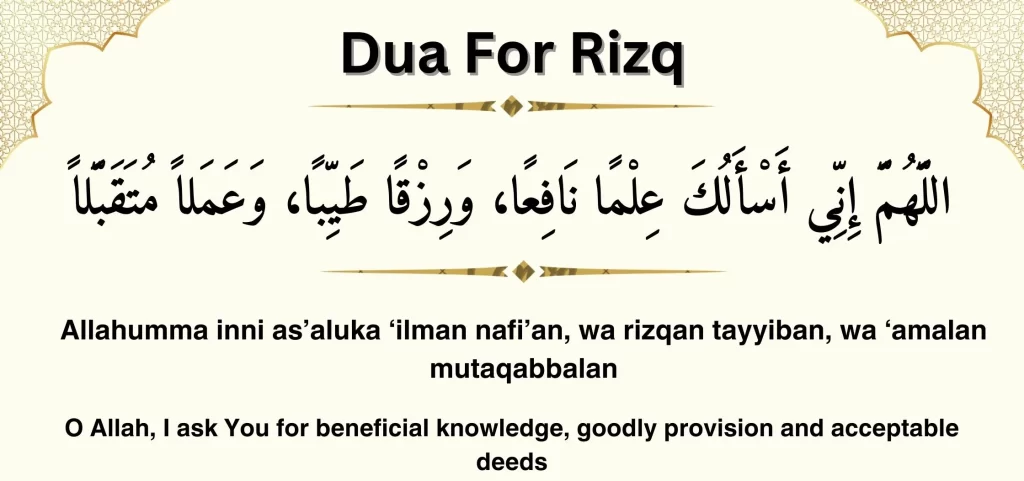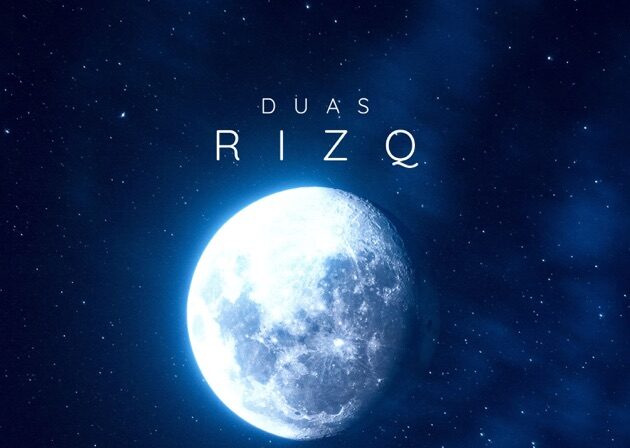Provision, or Rizq, is one of the most fundamental blessings bestowed by Allah upon His creation. It encompasses not only wealth and livelihood but also sustenance, health, and overall well-being. Muslims believe that all provision comes from Allah, the All-Sustainer, and therefore seek His help and mercy through duas (supplications) for abundant Rizq. This comprehensive guide explores the significance of Dua For Rizq, presents authentic supplications from the Quran and Sunnah, and offers insights into integrating them into daily worship for spiritual and material prosperity.
Understanding Rizq in Islam
In Islam, Rizq is far more than financial wealth; it implies everything that sustains life and nourishes the soul — food, shelter, knowledge, peace, and ease. The Quran reminds believers that Allah is the ultimate Provider:
“And there is no creature on earth but that upon Allah is its provision…” (Quran 11:6)
Despite this divine promise, Muslims are encouraged to seek Rizq through effort, prayer, and reliance on Allah. The Prophet Muhammad (peace be upon him) taught that sincere dua is a powerful means of attracting Allah’s mercy and increasing one’s Rizq.
Importance of Making Dua For Rizq
-
Expression of Tawakkul (Reliance on Allah): Dua For Rizq is an expression of one’s reliance on Allah alone for needs and sustenance, acknowledging that human effort alone is not sufficient.
-
Purification and Blessing (Barakah): Supplication invites barakah, the divine blessing that multiplies and sustains wealth and provision beyond worldly limitations.
-
Spiritual Growth and Contentment: Seeking Rizq through dua strengthens faith, increases patience, and wards off anxiety about material needs.
-
Opening of Doors and Removing Hardships: Allah mentions in the Quran that He opens the doors of mercy for those who ask sincerely, helping overcome blockages to sustenance.
Authentic Dua For Rizq from Quran and Sunnah

1. Dua of Prophet Ibrahim (Abraham) for Blessings in Rizq
Prophet Ibrahim prayed for blessings in his sustenance and offspring:
“And grant me from Yourself a child who will be righteous. Indeed, You are the Hearer of supplication.” (Quran 37:100)
Though this dua is partly about righteous offspring, it is also a supplication for blessings in what Allah has provided.
2. Dua For Sustenance by Prophet Muhammad (peace be upon him)
The Prophet said:
“O Allah, I ask You for beneficial knowledge, good provision, and accepted deeds.” (Sahih Muslim)
This short but powerful dua links good provision with beneficial knowledge and accepted actions, encompassing spiritual and worldly success.
3. Dua of Yunus (Prophet Jonah) in the Belly of the Whale
When Prophet Yunus was in distress, he turned to Allah with this dua:
“There is no deity except You; exalted are You. Indeed, I have been of the wrongdoers.” (Quran 21:87)
Though it is a dua of seeking forgiveness and relief, it exemplifies turning to Allah in crises, which can extend to asking for ease in provision.
4. Dua For Removal of Hardship and Increase of Rizq
The Prophet Muhammad taught:
“O Allah! bless my nation in their early mornings.” (Reported in Ahmad, Ibn Hibban)
This dua is a general supplication asking Allah to bless the beginning of the day—an auspicious time for sustenance to increase.
Practical Dua For Rizq to Recite
Surah Al-Waqi’ah (Chapter of the Event)
Reciting Surah Al-Waqi’ah daily is widely recommended for increasing Rizq and preventing poverty.
The Prophet Muhammad said: “Whoever recites Surah Al-Waqi’ah every night, poverty will never touch him.” (Reported by Al-Hakim)
Ayat Al-Kursi (Verse of the Throne)
Reciting Ayat Al-Kursi after every prayer is believed to secure Allah’s protection and increase sustenance.
The Last Two Verses of Surah Al-Baqarah (2:285-286)
These verses include a dua for seeking forgiveness and mercy, which cleanses and invites barakah.
Dua For Increase in Wealth and Blessing
One can say:
“Allahumma inni as’aluka rizqan tayyiban, wa ‘ilman nafi’an, wa ‘amalan mutaqabbalan.”
(O Allah! I ask You for good (halal) provision, beneficial knowledge, and accepted deeds.)
Etiquettes and Tips for Making Dua For Rizq
-
Sincerity and Hope: Make dua with complete sincerity, hope, and certainty that Allah will respond.
-
Consistency: Regularly recite these supplications, especially during blessed times (after obligatory prayers, between Adhan and Iqamah, during Tahajjud).
-
Halal Earning: Seeking Rizq must be coupled with earning through honest and halal means.
-
Gratitude: Always express gratitude for current blessings even when asking for more.
-
Hard Work: Alongside dua, put sincere effort into work and trade. Dua is a spiritual support, not a substitute for action.
Stories of the Prophets on Rizq and Reliance on Allah
The Quran is filled with inspiring stories of prophets who relied on Allah for Rizq:
-
Prophet Musa (Moses): Relied on Allah’s sustenance after fleeing Egypt.
-
Prophet Sulaiman (Solomon): Was granted vast provision and control over natural forces.
-
Prophet Muhammad: Despite poverty in early life, his trust in Allah led to abundant provision.
These examples teach that reliance on Allah combined with effort leads to prosperous outcomes.
Benefits of Dua For Rizq
-
Spiritual Peace: Calms the heart and soul by surrendering worries to Allah.
-
Increase in Rizq: Opens ways to unexpected and blessed sustenance.
-
Removal of Difficulties: Smooths financial and life challenges.
-
Strengthened Faith: Builds stronger trust in Allah’s wisdom and timing.
-
Blessings in Time and Wealth: Brings barakah that multiplies and preserves what you have.
FAQs
What is the best Dua For Rizq?
The dua Allahumma inni as’aluka rizqan tayyiban (O Allah, I ask You for good provision) is a powerful and comprehensive supplication for increasing halal and blessed Rizq.
How often should I recite Dua For Rizq?
It is beneficial to recite provision-related duas daily, especially after obligatory prayers and during blessed times such as Tahajjud (night prayer).
Can dua alone increase my Rizq without work?
No, dua must be combined with sincere effort, lawful work, and honest earning. Dua enhances and blesses the provision but does not replace effort.
Does Surah Al-Waqi’ah really help with poverty?
Traditionally, it is believed that regularly reciting Surah Al-Waqi’ah brings blessings to one's sustenance and helps prevent poverty, based on prophetic guidance.
What else can I do besides Dua For Rizq to improve my provision?
Along with dua, practicing gratitude, giving charity (sadaqah), maintaining honesty in business, avoiding wastefulness, and trustworthy conduct are key ways to increase Rizq.
Conclusion
Dua For Rizq exemplifies a Muslim’s deep reliance on Allah as the ultimate Sustainer. While effort and halal earnings are necessary, consistent and sincere supplications unlock divine mercy, blessings, and barakah in provision. Incorporating authentic duas from the Quran and Sunnah in daily worship and maintaining faith that Allah’s provision never fails encourages patience, gratitude, and spiritual growth. Ultimately, seeking abundant Rizq through dua nurtures the heart and enriches worldly life while strengthening the eternal connection with the Creator.


